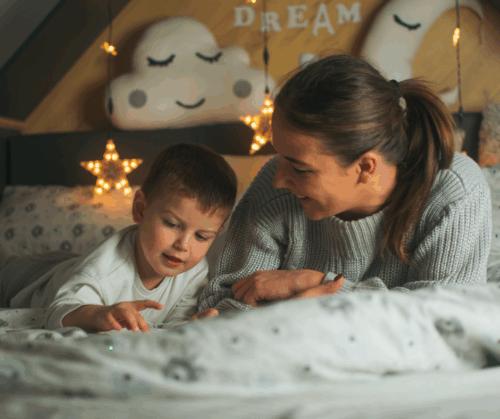Reading bedtime stories is a proven strategy for supporting young minds. From boosting vocabulary and emotional intelligence to improving sleep and school readiness, bedtime reading plays a vital role in early childhood development. At Collaborative for Children, we champion this simple yet transformative practice as part of our commitment to helping Greater Houston families build strong educational foundations from birth.
Research shows that children who are read to regularly develop stronger language skills, better memory, and improved emotional regulation. When a child listens to a story, their brain activates regions responsible for imagination, comprehension, and multisensory integration; even if they’re just hearing the words without seeing pictures. This mental stimulation lays the groundwork for literacy and cognitive growth.
Children exposed to bedtime reading from infancy tend to have larger vocabularies and are more likely to succeed academically. By age three, consistent storytelling routines are linked to longer sleep durations and fewer nighttime awakenings, which further supports learning and emotional health.

Bedtime stories create a safe, nurturing space for children to explore emotions and build empathy. Through characters and narratives, children learn to identify feelings, understand perspectives, and express themselves more clearly. This emotional literacy is essential for social development and classroom success.
Dr. Leora Mogilner, a pediatrician and director of Reach Out and Read, emphasizes that bedtime reading promotes parent-child bonding while developing literacy and social-emotional skills.
At Collaborative for Children, we encourage families to use storytelling as a daily opportunity to connect, reflect, and grow together.
Unlike screens, which emit blue light that disrupts melatonin production and sleep quality, books help children wind down naturally. Reading physical books before bed supports healthy sleep cycles and reinforces a calming routine. This is especially important in today’s digital age, where screen exposure is often unavoidable.
Collaborative for Children recommends replacing evening screen time with storytelling to improve sleep hygiene and promote deeper connections between caregivers and children.
We offer resources and training for parents, educators, and child care providers to make bedtime reading a consistent and impactful part of a child’s routine. Our certified child care centers of excellence integrate STEAM-based curriculum and literacy-rich environments that extend learning beyond the classroom.
Whether through our family engagement programs or our certified ECE curriculum, Collaborative for Children empowers Greater Houston families to champion young futures one story at a time.
Building Reading Readiness at HomeBedtime reading boosts language skills, emotional regulation, and sleep quality, all of which support early learning and school readiness.
You can begin reading to your child as early as infancy. Even preverbal babies benefit from hearing stories and bonding with caregivers.
Choose age-appropriate books with engaging stories, rhythmic text, and calming themes. Avoid screens and overstimulating content before bed.